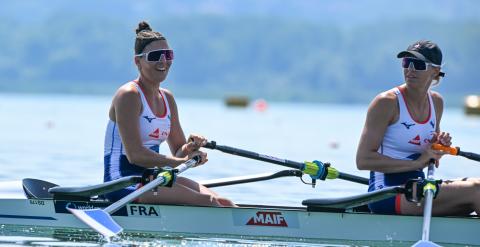
Combining Olympic preparation and physiotherapy studies: Margaux Bailleul talks about her dual life
Top-level sport is a particularly demanding lifestyle, governed by ambitious goals. These goals are obviously not only sporting but also professional, as athletes need to anticipate the second half of their career. This is why many young sportsmen and women combine sport with studies. At Université Paris-Saclay, there are large numbers of athletes among the students of the ‘École nationale de kinésithérapie et de rééducation’ (ENKRE, National School of Physiotherapy and Rehabilitation).
It is hard to believe, but it was quite by chance that Margaux Bailleul took up rowing at the age of twelve when she was looking for a winter sport. However, she soon qualified for the French championships and finished fourth. That was when she made her decision: "I will never stand at the foot of the podium again - that's not what you train for." This marked the start of a journey to the top of French rowing. Since then, Margaux Bailleul has been crowned French champion 17 times, including ten individual titles.
Alongside her sporting career, she plans to become a physiotherapist, specialising in paediatrics. She is now a student at the ‘École nationale de kinésithérapie et de rééducation’ (ENKRE, National School of Physiotherapy and Rehabilitation), a partner of the Faculty of Medicine at Université Paris-Saclay. With her A levels in her pocket, Margaux joined the National Institute of Sport, Expertise, and Performance (INSEP) and, under the terms of a collective agreement between the two establishments, enrolled on the Science and Techniques of Physical and Sports Activities (STAPS) degree at Université Paris-Est Créteil (UPEC), whose courses are taught at INSEP. "I was lucky enough to be in a class at INSEP. It was more practical for training," she explains.
A school that adapts to its athletes
At the end of this first year of study, she joined ENKRE and was offered a special course for high-level athletes. One particular feature is that her years are divided in two, "I do one year of education in two," explains Margaux Bailleul. This means she only has half of the course load each year. This adaptation is essential to ensure that she can train daily and prepare for her many competitions as well as possible: two rowing sessions on a boat or rowing machine in the morning and a weight training session in the evening. "I can only go to class between 1pm and 5pm," sums up the sportswoman and student.
Furthermore, only certain subjects can be studied remotely, "but in physiotherapy, with its practical work (TP), this is often not possible." Margaux Bailleul also has the option of moving the end-of-term exams if they take place during a competition. "The end-of-term exams take place online, and one person on the team is certified to monitor us," she explains.
Keeping all lights green
In addition to university education, every aspect of daily life must be adapted to the demands of top-level sport, even though rowing is not recognised as a professional sport in France. "We don't get paid, so we have to cover our backs," says Margaux Bailleul. Since October, the sportswoman has been part of the "Army of Champions", a French Army unit which provides her with a salary and the means to finance her sporting career. Apart from a few days a year devoted to this activity, she is fully seconded to follow her training programme and competitions.
Once the funding has been found, the sportswoman has to balance her life by keeping the three cursors at the right level: sport, studies and family and social life. For 2024, the year of the Paris Olympic and Paralympic Games, the sportswoman has chosen to take a gap year from ENKRE, "it's the most intense year, where we do a bit more training," she says. "In the end, I cut back on college a bit and chose to go home to see my loved ones as often as possible."
Finding the right support
This intense life requires the rower to pay particular attention to her well-being. Margaux Bailleul has learned to manage stress since the start of her sporting career: "You've made mistakes before and you learn from them," she sums up. However, she and those around her are particularly vigilant about fatigue. "Fatigue leads to a drop in motivation and difficulties in revising and concentrating. It's a vicious circle." To get out of it, she can count on those close to her. Her family, two coaches, a physical trainer and the INSEP medical staff provide solid support to help her maintain morale and optimise mental preparation.
Currently, along with the French team, the rower is competing to qualify boats for every event of the Paris Olympic Games. Together with her teammate, she has already qualified a boat in the double sculls, a race with two rowers per boat, each with two oars. The national selections for the rowers who will go on to the Olympic events will take place in late June. In the meantime, "we continue to train so that we can perform at our best and only have to repeat the movement, without doing anything new," concludes the top-level athlete.
- Combining a top-level sports career with university studies: a daily challenge
- https://www.universite-paris-saclay.fr/sportifs-de-haut-niveau-shn-et-sportifs-de-haut-niveau-universitaire-shnu
This article was originally published in L'Edition No. 23.
Find out more about the journal in digital version here.
Subscribe to the newsletter and never miss an issue.

